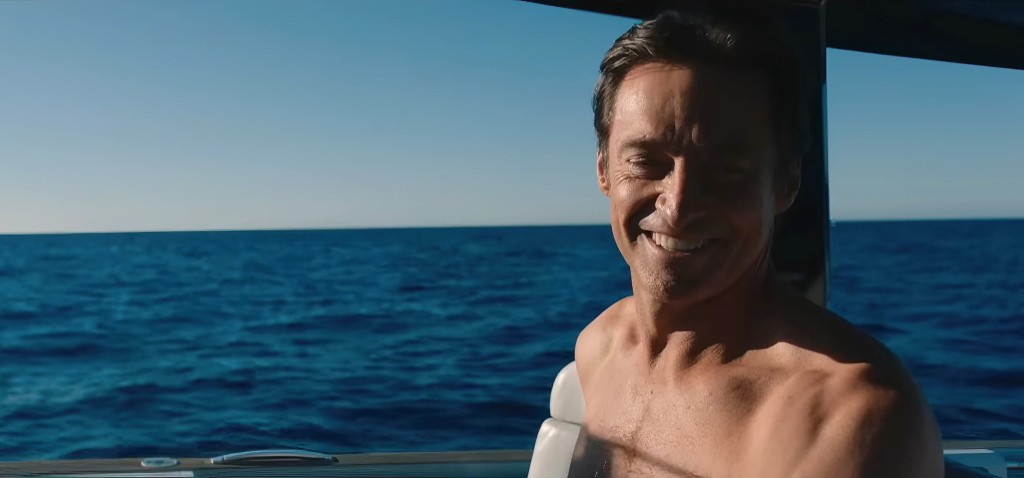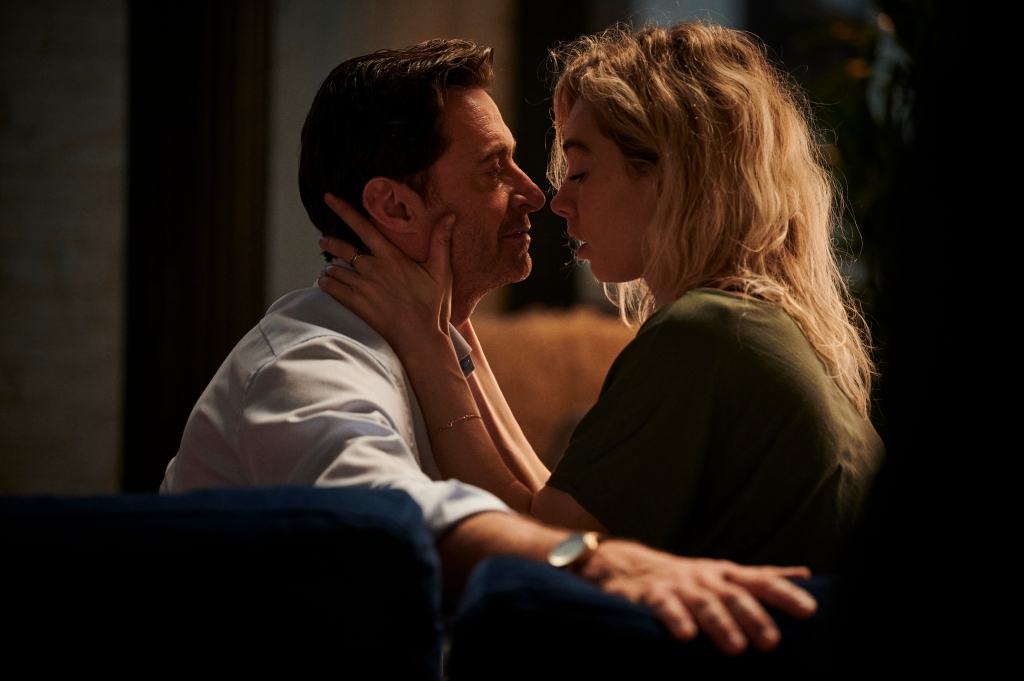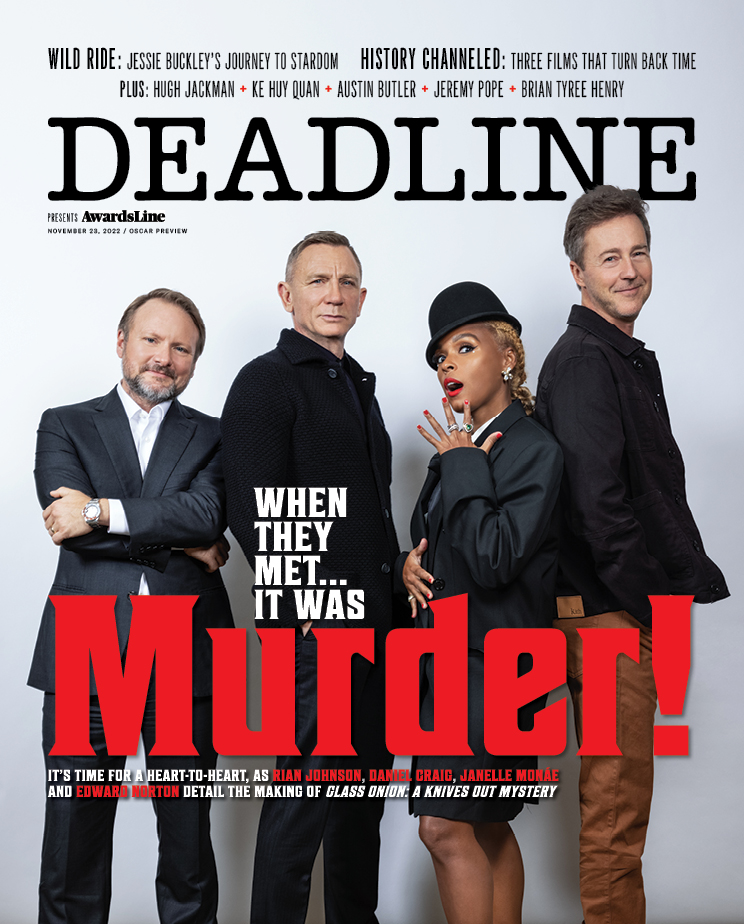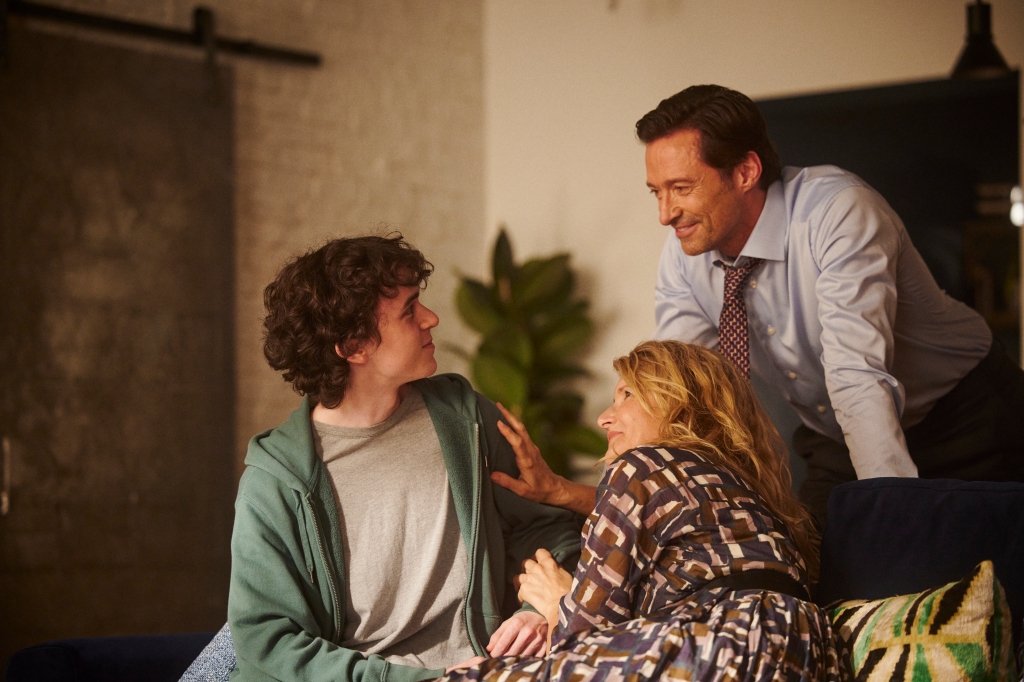In The Son, Hugh Jackman plays Peter, a man struggling with parenting his teenage boy, while attempting to break the chains of generational trauma he inherited from his own father, played by Anthony Hopkins. Writer-director Florian Zeller brings this, his second in a series of his plays, to the screen, having debuted The Father, also starring Hopkins, last Oscar season. In taking on this role, Jackman became the crux of a story so eviscerating and personal, he says it affected the way he parents his own children, while at the same time, he felt the presence of his father, who passed away during the shoot.
DEADLINE: First off, I just wanted to tell you, I love that in your early career, you had been up for a part in the Australian soap Neighbours and you turned it down.
HUGH JACKMAN: I have to tell you, my sister was living in England at the time and she was 12. At the [show’s] height. When I got offered it, it was not long after Kylie [Minogue] and Guy Pierce [were in it]. And she went to school and told everybody that her brother was going to be in Neighbours and no one believed her. She goes, “You’ll see!” And about a month later, I got the offer to go to Perth, and I turned it down. And she was like, “No! You have to do it! You have to do it!” She said she got so much shit at school.
DEADLINE: You ruined her high school life.
JACKMAN: Totally. Literally in her first year of high school.
Rekha Garton/See-Saw Films/Sony Pictures Classics
DEADLINE: I was personally so affected by this film. I’m still thinking about it. Had you seen the play The Son before taking this on? Obviously, you must have seen the film The Father.
JACKMAN: First of all, thanks for saying that. It reminded me, Florian used to say, when they did the play in Paris five years ago, people would stay in their seats or wait after to meet with him and the actors. Not to say, “Congratulations” or “Can I get an autograph?”, but just to talk about their experience. There are so many people experiencing this or know someone very close to them who are, and there’s just very little opportunity to really talk about it.
By the way, the experience still sits with me a year later, watching the movie, and as not as an actor, but as a father, as a son, all of that. So, I know what you mean, but I appreciate you saying it.
I knew of Florian’s work. I almost did one of his plays about six years ago, but the timing didn’t work out. And I’d seen The Father and absolutely loved every frame of the film. And then my agent told me that they were going to make The Son. So, I read the play that day and rang her back and she told me there were a couple of other actors circling it that Florian was talking with. And I was like, “Oh, this is awkward.” But I really felt an immediate urgency to play the role or to put my hand up for it. So, I just emailed him and I said, “Listen, if you’re dancing with someone else, I don’t want to cut in. But if you’re not, I would love to play the part.” And I was just very sort of upfront about that. And he emailed me back, said, “No, I don’t know what you’ve heard. I’m not talking to anyone, so let’s speak.” And we Zoomed the next day and that was it. He offered me the part seven minutes into the conversation.
He’s very, very smart. He operates and trusts his instincts as much as anyone I’ve ever met. He’ll just go with his gut. Baz Luhrmann’s a bit the same actually, now that I think about it. But he was not planning to offer me the part, he just thought I’d meet him, and he said he just had an instinct in his gut seven minutes in and he just said, “Can we stop talking?” And I said, “Yeah.” He said, “I want you to play the part.” And I was completely surprised. I had no idea.
And I remember being terrified making the Zoom call because I said to my wife, “I’ve never been so scared to get a part or to not get a part. Both things at once.” I knew what it would be to play the part, to play the role, but I also really felt an urgency to do it and to be part of the story.
DEADLINE: How did Florian explain your character to you?
JACKMAN: He explained him as a good man, really trying his hardest to do the right thing with unresolved issues from his childhood, from his ex-wife and his marriage. And someone who is believing he’s doing the right thing at all times and feeling it’s his responsibility to fix things. But ultimately a good man under a lot of pressure.
We didn’t rehearse, which was unusual. He’s a theater guy as am I, so I love rehearsals, as does he. But he said, “I don’t want to rehearse. And Hugh, I invite you not to feel that this is very far from yourself, this character.” Basically, he was asking me to bring myself to the part and to the experience and just to trust whatever I was feeling. And so, we really would go in every day having no idea … I mean, he obviously had an idea, but I had no idea where we would start, where we would finish in terms of levels or where we would go. It was just very free.
DEADLINE: You’ve done a plethora of things, but this felt tonally very different from anything I’ve seen you in before.
JACKMAN: Yeah, I agree.
DEADLINE: Was that what frightened you about it?
JACKMAN: Yeah. It’s frightening. The challenge that Florian was giving all of us was to reveal ourselves and our own heart and our own experience of life, and just allow that to be enough. And not to cover it or search for some particular other character or go too far from ourselves. And he invited us to let go. That’s the sort of thing you talk about a lot as an actor, just letting go and allowing instinct to take you. But I think because, for whatever reason, the time in my life, the part, the way it was be beautifully written, I could see what an extraordinary opportunity it was and I just didn’t want to screw it up, basically.
If you think of that restaurant scene with Laura [Dern], I remember reading that scene going, “Oh, that is brutally honest, beautifully written. That’s one of the best pieces of writing. And I’m going to be with Laura Dern, and I really hope I can bring it.” You know what I mean? I hope I can rise to the challenge.
Or the scene where I really lose my shit with my son and end up pushing him over. Now, I’m a parent. I know what it’s like to have your buttons pushed in a way they haven’t been pushed since I was maybe a teenager. Most of the time, you can control a lot of your emotions. But for whatever reason, not that I’ve pushed them over or anything, but I’ve experienced that kind of loss of control, that feeling. And so, when you read things like that, it’s an amazing opportunity. But you know the reality of it and how surprising it is when it happens in real life. Shocking. And you just hope that you can bring that on the day. So that was part of the fear. And also, the unknown. I knew it was going to take me to places that are terrifying, emotionally.

Sony Pictures Classics/Courtesy Everett Collection
DEADLINE: This film shows without telling how we aim to escape what our parents did and yet ultimately do exactly what they did.
JACKMAN: Yeah. The scene, which was not in the play, with Anthony Hopkins, it’s so beautiful because you’re halfway through the movie and of course, with the title, The Son, you’re focusing on this troubled teenager. Then all of a sudden you go, “Oh, hang on. Oh, Peter’s the son. Oh, I see. We’re all still children.” It’s so beautifully done, I agree. And yeah, these traumas, they just are passed down like a wildfire through the generations. It takes such enormous wisdom and courage to be able to stop it. On a smaller level, I remember when my son was born. My father’s name is Chris, and I remember my wife saying, “Oh, hello, Chris.” And all of a sudden it was very regimented, very disciplined, and on a timetable at all times. For the first time in our marriage she goes, “Oh, who’s this guy?” So, it’s really interesting how that happens.
DEADLINE: His ego is driving this need to be a ‘great dad’. And that is his downfall in exactly the same way as his father was driven by ego. I do think that the greatest thing you can do for anyone is to be willing to be seen as the ‘bad person’ for their own good. And Peter couldn’t bear that.
JACKMAN: True.
DEADLINE: He couldn’t be the ‘bad guy’ in the hospital and make his son stay there, which was what he really needed for his health.
JACKMAN: Well, his son uses it twice: the word “abandonment”. The very first thing Laura says is, “You can’t abandon him.” And you see him bristle and then the son says, “Don’t abandon me, Dad. Don’t abandon me.” And of course, [Peter] was abandoned by his father. He thinks, if there’s one thing I will not do, it’s abandon my son. I will be the one, I will be there for him.
You’re right. It’s so hard to escape the pain and the injuries that we have from childhood. And yeah, I think you said it beautifully. To be able to put yourself second to the needs of someone else is truly heroic, particularly when it’s your kid.

Robert Youngson/See-Saw Films/Sony Pictures Classics
DEADLINE: You mentioned your dad. I’m so sorry for your loss, it must have been so hard working on this at that time.
JACKMAN: Thank you. He passed away during the film and nearish to the end. I remember that scene at the end that you were describing where I imagined [my character’s son] coming back. That particular scene, which was very difficult to do, was just a few days after he passed away.
Normally, I would approach a scene like that, or I’d think about a scene like that as almost, “I need to get into my zone, let everyone do their job around me. I can’t be affected by it. I need to create my own space here.” But weirdly, I just didn’t feel like you get through it without the help of everyone. So, I would, without them knowing it, I would look at all of them. I actually wrote something down the morning of that scene, just energetically, quietly asking … I wrote down all of them by name. I need help. I need their support. I needed to connect rather than to close off. And I can remember feeling his presence there, very clearly, in the room.
DEADLINE: Wow.
JACKMAN: Yeah. I don’t know, maybe I was making that up, but that’s what I remember feeling.
DEADLINE: It must have just been an eviscerating experience.
JACKMAN: Cathartic as well.
DEADLINE: What has stayed with you from this experience personally and professionally?
JACKMAN: I certainly have learned a lot about vulnerability as a parent. The idea of not knowing. The idea of admitting. I mean, I have a 17 and 22-year-old. So, the idea of leading with … I’m not hiding from them my vulnerabilities or my doubt or my worry.
Just recently, I remember I was worried about something with one of my kids and I could see the look on their face, and I could see that they thought I was disappointed. That’s what I was reading. My son walked off and I went downstairs, and I said, “I get that feeling you think I’m disappointed, but I’m just worried.” And we ended up having really good conversation. And I think prior to this movie, I would’ve thought, that’s not helpful for them. That actually, what they need is strength and surety and a kind of feeling that, “My dad knows what to do.” That feeling. But actually, I realize that doesn’t help. And it’s OK to have these discussions.
I think professionally, what I learned was a sense of trust in myself and in my other actors and allowing things to open up on the day and not to control things too much. To let go more. Trust my instincts more.
DEADLINE: Do you know how would you deal with the kind of serious mental illness we see in the film? I thought, “Oh, my God, I would just take them to the hospital and put them on medication.” But of course, it’s not that simple. It’s a lifelong illness.
JACKMAN: Yeah. It’s so hard to know what to do. And I think there’s so much shame around it. There’s so much guilt and ignorance. We really don’t know a lot. We’re in the infancy, I think, of that. If you think of something like alcoholism, I feel like we’re a lot further down the track with that. We’ve been dealing with that for a long time. People know more. But with mental illness, we’re sort of at the beginning.
I think what I’ve learned is never worry alone. Just being in the nuclear family is not enough. And there’s a line and I think love is not enough. It’s not always enough. It’s essential, you need it, but it’s not enough in these situations. You need professional help. You need family, you need friends. Everybody needs different support.
My wife and I talk about that a lot to make sure that our village is strong and not just hiding things off or thinking there’s going to be shame associated with this and making … I mean, there’s a difference between secrecy and privacy obviously, but just making sure there’s enough help and things aren’t just being bottled up or denied or kept hidden. It’s easy to think, “Oh, it’s just a phase.” And people go, “Well, they’re 17, it happens, and we’ve just got to push through a little bit.” But it’s so hard to know what is actually a problem that’s going to be around for a long time, or this is just a little six-month phase. And I think it takes people with real knowledge of that, real experience. And maybe some objectivity.

DEADLINE: Everyone is obviously so excited about you coming back as Wolverine in the new Deadpool. I read an interview where you said you saw it as a kind of 48 Hours. How did it come about, that idea in the beginning? That you would do it together?
JACKMAN: Well, I was 20 minutes into watching Deadpool and I had just announced, literally, a few weeks before that Logan was going to be my last, which I fully intended. And then I was like, “Uh-oh.”
And here’s maybe a bit of a hangover from Florian. I was just driving out to the beach. It was mid-August, I had a week off from the show [The Music Man on Broadway], my first week off in eight, nine months, 10 months. And it came to me like, “I really want to do that.” And that was it.
As soon as I arrived at the beach, I rang Ryan [Reynolds] just to see what the hell was going on. And then here we are. It was so quick. And trust me, there’s not a morning I don’t wake up where Ryan Reynolds is outside my house with posters saying, “Please.” He’s constantly asking me about it. And I was like, “Dude, I’m done. I’m done, I’m done, I’m done, I’m done, I’m done.” So then when he rang me [back], he was like, ‘Are you serious?” So yeah.
I’m a terrible poker player. All this time I was saying I was done, I really meant it. But anyway, somewhere deep down, this idea was obviously lurking and brewing.

